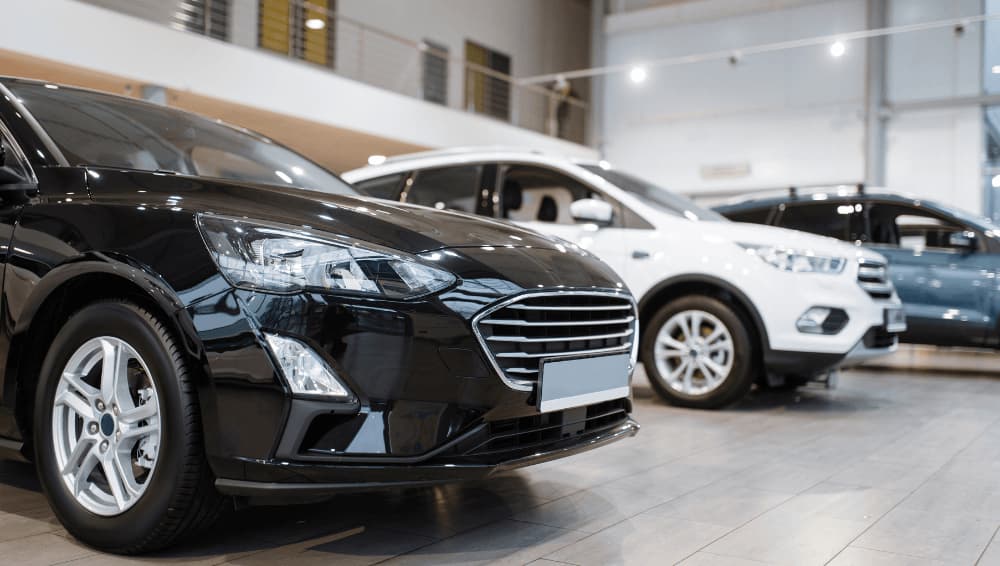What is digital transformation in the automotive industry?

Published:
The automotive industry is one of many that is undergoing a digital revolution of unprecedented heights.
With the help of automation, almost all parts of an automotive supply chain, from parts manufacturers and assembly lines to mechanics and suppliers, can experience improved productivity, greater flexibility, and shorter lead times.
Propelled by paperwork digitisation, software advancements, seamless connectivity, and growing customer expectations, digital transformation promises to offer even greater potential for the industry in the coming years, with some truly innovative products on the horizon.
In this article, we’ll explore some of the key trends driving this change and what it means for the future of those responsible for manufacturing, delivering, and using vehicles.
The shift from analogue to digital
The automotive industry still relies on many manual processes that need augmenting with the help of enterprise-grade technology. Simple everyday tasks like data aggregation, inspections, insurance claims, and financing involve heavy human oversight, and there’s an argument to be made that these should not be entirely trusted to algorithms and software. To a large extent, critics of widespread AI and automation have a point here.
Many automotive businesses have paper-based processes in place, not recognising the tremendous value of eSignatures (electronic signatures) and digital document storage that facilitates transactions. Many other businesses work as siloed islands of operations rather than as connected cogs in a proverbial machine, preferring to adopt digital solutions that suit them.
Digitising multiple areas of the automotive sector
At the same time, proponents of automation technology will argue that the industry is crying out for support in many areas. Digital disruption in the automotive sector has led many leading brands to implement digital tools in areas like manufacturing, retailing, and marketing. Even standalone third-party vehicle diagnostics and repair shops that fix specific brands of vehicles like Mercedes are relying heavily on technology to augment and streamline operations for the benefit of their customers.
Manufacturing: Applying digital tools and methods that can make vehicle manufacturing more efficient and less labour-intensive. Automating production processes with the help of robotics is already second nature to many vehicle manufacturers, with digital solutions allowing end users to monitor equipment and identify quality faults or errors.
Marketing and Retail: Drivers can access information through a plethora of different digital platforms, with retailers and financing partners often working hand-in-hand to deliver customers an immersive, personalised experience. Targeted advertisements, bespoke quotations, interactive content and nurtured experiences would not be possible without the help of technology.
Repairs and Testing: Car mechanics and centres rely heavily on cloud-based technology to access information, decrease processing time, minimise bottlenecks and access all vehicle ownership and tax documents seamlessly. Digital tools are being more widely adopted to address specific complex challenges and issues that may befall drivers. Before a vehicle is retail-ready, however, testing and diagnostics processes are increasingly reliant on similar technology to isolate issues and maintain quality assurance and compliance.
The salient point in the digital transformation discussion is that, for all of the benefits it offers the automotive sector, it still requires human oversight and supervision for it to be successful.
Connected cars and the internet of things
Real-time traffic updates, built-in GPS software, and immersive entertainment options in vehicles aren’t exactly new. However, expect these to become largely inferior to some other groundbreaking innovations on the horizon.
Vehicle technology has rapidly evolved from exclusively mechanical and man-made systems to millions of integrated sensors, parts, and fixings. Over time, this has evolved into a phenomenon known as ‘connected’ or ‘self-driving’ cars, of which there is arguably no better example of the potential of the automotive industry’s increasingly digital future. No example has become more synonymous with automating the driving experience than the idea of a car that contains built-in AI features that include intelligent cruise control, lane centring, and smart collision prevention.
By 2030, experts predict that a tenth of all worldwide cars could be self-driving. Meanwhile, a KPMG study (commissioned by SMMT) predicts that autonomous vehicles could add £51 billion per year to the UK economy by the same year while creating 320,000 new jobs, 25,000 of which would specifically lie in manufacturing.
The benefits will likely include:
- Enhanced road and passenger safety
- Smoother traffic flow
- Reduced insurance costs
For automobile manufacturers, the data generated from connected cars provides incredibly valuable insights into performance issues, usage patterns, and much more – ultimately driving engineering and design improvements. However, the manufacturing of a new generation of vehicles still requires heavy human oversight and influence to drive economic growth in this sector.
Few areas showcase the possibilities of digital transformation better than self-driving vehicle technology and hands-free driving.
Accelerating new business models
Digital solutions are also empowering automotive companies – at various ends of the supply chain – to engage their prospects and customers by altering business models. Looking beyond exclusively focusing on vehicle sales, multiple business models could be drastically changed when more transparency is dedicated towards technology.
What happens on a vehicle showroom floor plays an important role in customer satisfaction and creating personalised experiences. However, as more purchases move into the digital terrain, dealers and vehicle makers must adapt their strategies to cater for a growing online audience. Research from GoCompare suggests that most Brits (51.8%) will still buy through dealerships, however, the number of online buyers has grown in recent years.
Supported by attention-grabbing visuals, effective CTAs, carefully worded messaging, and enterprise-grade analytics, vehicle manufacturers, suppliers, and distributors can create effective digitised experiences that open new revenue streams and sales opportunities.
Preparing for digitisation and what lies ahead
To fully capitalise on digitisation, the automotive industry needs to closely examine its current processes and data infrastructure. Core questions business leaders should be asking include:
- Which manual processes can be eliminated through automation?
- What customer pain points can technology help solve?
- How can data be better structured and leveraged?
- Where are the tool and skill gaps that need to be filled?
- How can staff be supported through retraining and upskilling opportunities?
While sweeping changes driven by technology can seem daunting, the payoff from enhanced productivity, innovation and revenues makes it worthwhile. The move to electric vehicles (EV) is well in effect as part of global transitions to net zero, with a forthcoming ban on new petrol and diesel car sales, along with increased talks of five desperately-needed ‘gigafactories’ for improved manufacturing. Technology will likely be at the heart of this movement.
In the coming years, the vehicle industry is set to experience even more dramatic transformation through greater connectivity and creative automation, and those who make confident, informed strides towards digitisation will gain a healthy competitive advantage, both now and in the near future.
Transform your automotive business with Signable
As the automotive industry continues its shift towards digital transformation, the need for streamlined, efficient, and customer-friendly processes becomes even more critical. One area where immediate gains can be made is in how documents are sent, signed, and stored – and this is where eSignature solutions like Signable play a vital role.
Signable offers an electronic signing platform specifically suited to the unique demands of automotive businesses. From dealerships and rental agencies to fleet operators and accident management firms, Signable helps reduce paperwork, speed up turnaround times, and improve customer experience.
Automotive teams frequently rely on repeat documents such as vehicle finance agreements, warranty forms, test drive waivers, or hire contracts. With Signable, these documents can be saved as templates and reused in seconds, reducing manual admin and ensuring consistency across departments or locations.
To further streamline operations, automatic reminders can be set up to prompt signers who have not yet completed their documents. This helps reduce delays and keeps workflows moving without requiring constant follow-up from staff.
Signable also offers an API integration, enabling businesses to embed signing functionality directly into their existing platforms, such as a Dealer Management System (DMS), fleet software, or a car rental portal. This flexibility ensures that digital signing fits seamlessly into existing processes without disruption.
Every document signed through Signable includes a full audit trail with time-stamped activity logs. This provides peace of mind and simplifies compliance with key regulations such as FCA Consumer Duty, GDPR, and DVLA requirements – especially for businesses handling sensitive customer or employee information.
Unlike larger, more complex eSignature providers, Signable offers straightforward pricing with no hidden costs or rigid contracts. Automotive businesses also benefit from responsive, UK-based customer support, ensuring that teams can get help quickly and speak with people who understand their needs.
Ready to take the next step?
Whether you’re looking to simplify internal workflows, speed up contract turnaround, or improve your customer journey, Signable is a powerful yet easy-to-use eSignature solution built for the automotive industry.
Start your free 14-day trial today and see how Signable can support your digital transformation.
Get started in under 60 seconds
Check out our free 14 day trial and start sending documents now.
